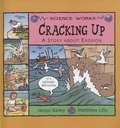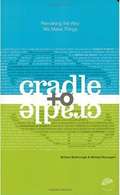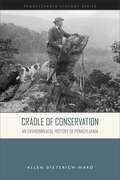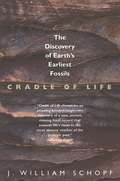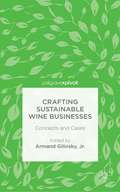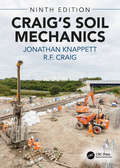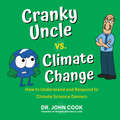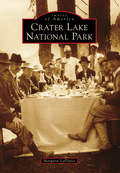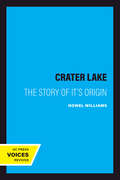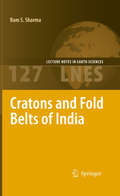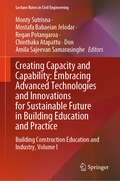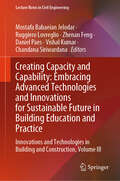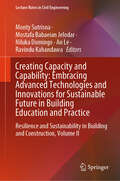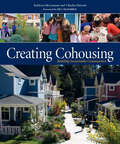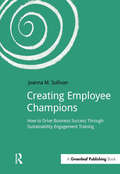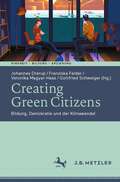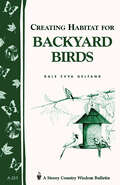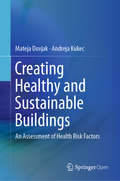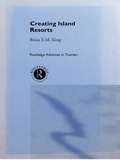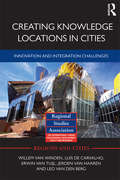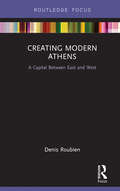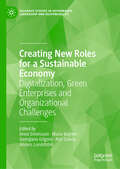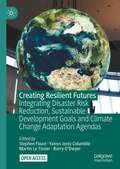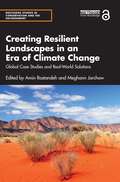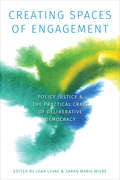- Table View
- List View
Cracking Up: A Story About Erosion (Science Works)
by Jacqui Bailey Matthew LillyDescribes the process of erosion, how weather and water wear away the earth's surface, and what happens to the materials that are worn away.
Cradle To Cradle: Remaking The Way We Make Things
by William Mcdonough Michael BraungartA manifesto for a radically different philosophy and practice of manufacture and environmentalism "Reduce, reuse, recycle" urge environmentalists; in other words, do more with less in order to minimize damage. As William McDonough and Michael Braungart argue in their provocative, visionary book, however, this approach perpetuates a one-way, "cradle to grave" manufacturing model that dates to the Industrial Revolution and casts off as much as 90 percent of the materials it uses as waste, much of it toxic. Why not challenge the notion that human industry must inevitably damage the natural world, they ask. In fact, why not take nature itself as our model? A tree produces thousands of blossoms in order to create another tree, yet we do not consider its abundance wasteful but safe, beautiful, and highly effective; hence, "waste equals food" is the first principle the book sets forth. Products might be designed so that, after their useful life, they provide nourishment for something new-either as "biological nutrients" that safely re-enter the environment or as "technical nutrients" that circulate within closed-loop industrial cycles, without being "downcycled" into low-grade uses (as most "recyclables" now are). Elaborating their principles from experience (re)designing everything from carpeting to corporate campuses, the authors make an exciting and viable case for change.
Cradle of Conservation: An Environmental History of Pennsylvania (Pennsylvania History)
by Allen Dieterich-WardFrom the origins of “Penn’s Woods” to the controversial practice of fracking, Cradle of Conservation provides the first comprehensive study of Pennsylvania’s environmental history. The story starts with forester Ralph Brock at the dawn of the conservation era and continues through the eras of energy production using coal, oil, natural gas, and other resources. Allen Dieterich-Ward also investigates how the non-human world shapes the history of the commonwealth and examines the impact of pollution. Cradle of Conservation moves across time and place, from the Haudenosaunee people of the Susquehanna Valley, to the iron furnaces of nineteenth-century Pittsburgh, to the diesel trucks on the twentieth-century Pennsylvania Turnpike. In addition, Dieterich-Ward explores the histories of Philadelphia’s Schuylkill River and the state’s anthracite region and traces the environmental movements and crises that have led to public policy changes in the face of climate change. Cradle of Conservation deepens our understanding of how Pennsylvanians have conserved and consumed.
Cradle of Life: The Discovery of Earth's Earliest Fossils
by J. William SchopfOne of the greatest mysteries in reconstructing the history of life on Earth has been the apparent absence of fossils dating back more than 550 million years. We have long known that fossils of sophisticated marine life-forms existed at the dawn of the Cambrian Period, but until recently scientists had found no traces of Precambrian fossils. The quest to find such traces began in earnest in the mid-1960s and culminated in one dramatic moment in 1993 when William Schopf identified fossilized microorganisms three and a half billion years old. This startling find opened up a vast period of time--some eighty-five percent of Earth's history--to new research and new ideas about life's beginnings. In this book, William Schopf, a pioneer of modern paleobiology, tells for the first time the exciting and fascinating story of the origins and earliest evolution of life and how that story has been unearthed. Gracefully blending his personal story of discovery with the basics needed to understand the astonishing science he describes, Schopf has produced an introduction to paleobiology for the interested reader as well as a primer for beginning students in the field. He considers such questions as how did primitive bacteria, pond scum, evolve into the complex life-forms found at the beginning of the Cambrian Period? How do scientists identify ancient microbes and what do these tiny creatures tell us about the environment of the early Earth? (And, in a related chapter, Schopf discusses his role in the controversy that swirls around recent claims of fossils in the famed meteorite from Mars.) Like all great teachers, Schopf teaches the non-specialist enough about his subject along the way that we can easily follow his descriptions of the geology, biology, and chemistry behind these discoveries. Anyone interested in the intriguing questions of the origins of life on Earth and how those origins have been discovered will find this story the best place to start.
Crafting Sustainable Wine Businesses: Concepts and Cases
by Armand Gilinsky Jr.Sustainable wine businesses are being crafted around the world, leaving the land in better shape for the next generation. In this book, four case studies reveal that sustainability in the wine industry it is tied tightly to long-term profitability.
Craig's Soil Mechanics
by Jonathan Knappett R.F. CraigCraig’s Soil Mechanics continues to evolve and remain the definitive text for civil engineering students worldwide. It covers fundamental soil mechanics and its application in applied geotechnical engineering from A to Z and at the right depth for an undergraduate civil engineer, with sufficient extension material for supporting MSc level courses, and with practical examples and digital tools to make it a useful reference work for practising engineers. This new edition now includes: Restructured chapters on foundations and earthworks, the latter including new material on working platforms and collapse of underground cavities (sinkhole formation). New mobilised-stress-based deformation methods that can straightforwardly be used with both linear and non-linear soil stiffness models and field measurements of shear wave velocity, for serviceability limit state design. Extended sets of correlations for making sensible first estimates of soil parameters, adding deformation-based parameters for broader coverage than the Eighth Edition. Extended section on robust statistical selection of characteristic soil parameters. Greater use of consolidation theory throughout in determining whether actions, processes and laboratory/in-situ tests are drained or undrained. Extended chapter on in-situ testing, adding the Flat Dilatometer Test (DMT), and interpretation of consolidation parameters from CPTU and DMT testing. An updated section on pile load testing. Additional worked examples and end-of-chapter problems covering new material, with fully worked solutions for lecturers. The electronic resources on the book’s companion website are developed further, with the addition of two new spreadsheet numerical analysis tools and improvement of existing tools from the Eighth Edition. Using these, readers can take real soil test data, interpret its mechanical properties and apply these to a range of common geotechnical design problems at ultimate and serviceability limiting states.
Cranky Uncle vs. Climate Change: How to Understand and Respond to Climate Science Deniers
by John CookIt&’s Not Just the Facts When it comes to climate change, this truly is a golden age—of fake news, post-truths, pluralistic ignorance, conspiracy theories, a willfully ignorant administration, and the Cranky Uncle. You know him. We all have one. That exasperating Thanksgiving blusterer digs in his heels even as the foundation of his denial thaws faster than the Arctic ice caps. Written and illustrated by Dr. John Cook, cognitive psychologist and founder of the award-winning website Skeptical Science, Cranky Uncle combines humor and science to make clear, calm, and winnable arguments in the public controversy of climate change. Can we change our Cranky Uncle&’s mind? Probably, regrettably, not. But Dr. Cook makes it easier for us to understand him. And armed with this knowledge, prevent climate misinformation from spreading further.
Crater Lake National Park
by Margaret LaplanteFor more than half a million years, volcano Mount Mazama towered over southern Oregon. From time to time, it erupted, spreading pumice, ash, and cinders for miles around. Then, approximately 7,700 years ago, Mount Mazama erupted with such force that the volcano could no longer support itself and it collapsed, leaving a large caldera. Eventually, the volcanic action subsided and all was calm. Over the next centuries, water and snow accumulated in the caldera. In 1902, Crater Lake became a national park.
Crater Lake: The Story of it's Origin
by Howel WilliamsThis title is part of UC Press's Voices Revived program, which commemorates University of California Press’s mission to seek out and cultivate the brightest minds and give them voice, reach, and impact. Drawing on a backlist dating to 1893, Voices Revived makes high-quality, peer-reviewed scholarship accessible once again using print-on-demand technology. This title was originally published in 1941.
Cratons and Fold Belts of India (Lecture Notes in Earth Sciences #127)
by Ram SharmaCratons and Fold Belts of India, is a unique attempt at presenting geological characteristics and evolution of the fold belts and the cratonic areas of the Indian shield. The author has evaluated the different evolutionary models for each fold belt in light of all the currently available geological and geochronological informations that are clearly listed. Shortcomings, if any, of each model are stated and a viable geodynamic model is presented for each fold belt. The book is self-contained - it includes an introduction to the processes of mountain building, especially plate tectonics theory with its application to the evolution of the Himalaya as an illustrative example - so that the reader can better appreciate the novel approach to the evolution of Proterozoic fold belts. The author eschews a detailed account of the fold belts for a clear description of all the concepts that go into building models. It is primarily written for graduate students, teachers and for those geoscientists who aspire to know all about the Indian shield.
Creating Capacity and Capability: Building Construction Education and Industry, Volume I (Lecture Notes in Civil Engineering #562)
by Regan Potangaroa Monty Sutrisna Mostafa Babaeian Jelodar Chinthaka Atapattu Don Amila Sajeevan SamarasingheThis three-volume book is the proceeding of the 46th Australasian Universities Building Education Association (AUBEA) 2023 Conference which brings together papers on construction and built environment education and practice. This particular conference theme, “Creating Capacity and Capability: Embracing Technologies and Innovations for Sustainable Future in Building Education and Practice” is closely related to a flagship national research programme funded by the Government of New Zealand, known as the CanConstructNZ research programme, aiming to balance the capacity and capability in the construction industry and the national pipeline of construction projects. The capacity and capability of our construction industry in fulfilling the construction needs of the whole nation are reflected in the national pipeline of construction projects and have long been recognised as one of the main challenges facing the construction sector. The practices and education of building and construction play an important role in determining the capacity and capability of the construction industry. Within the context of achieving sustainable future and embracing advanced technologies to create capacity and capability in the construction sector, various concepts, research, and innovative development have emerged and taken place. This particular conference theme has facilitated more in-depth discourses and discussions on the latest ideas and innovation within the building and construction education and practice, not only from the Australasian region but also from the wider international community, including the USA, the UK, Brazil, South Africa, Nigeria, China, and Sri Lanka. The contents of this book will be of interest to academic researchers, industry professionals and policy makers alike.
Creating Capacity and Capability: Innovations and Technologies in Building and Construction, Volume III (Lecture Notes in Civil Engineering #564)
by Vishal Kumar Mostafa Babaeian Jelodar Ruggiero Lovreglio Zhenan Feng Daniel Paes Chandana SiriwardanaThis three-volume book is the proceeding of the 46th Australasian Universities Building Education Association (AUBEA) 2023 Conference which brings together papers on construction and built environment education and practice. This particular conference theme, &“Creating Capacity and Capability: Embracing Advanced Technologies and Innovations for Sustainable Future in Building Education and Practice&” is closely related to a flagship national research programme funded by the Government of New Zealand, known as the CanConstructNZ research programme, aiming to balance the capacity and capability in the construction industry and the national pipeline of construction projects. The capacity and capability of our construction industry in fulfilling the construction needs of the whole nation are reflected in the national pipeline of construction projects and have long been recognised as one of the main challenges facing the construction sector. The practices and education of building and construction play an important role in determining the capacity and capability of the construction industry. Within the context of achieving sustainable future and embracing advanced technologies to create capacity and capability in the construction sector, various concepts, research, and innovative development have emerged and taken place. This particular conference theme has facilitated more in-depth discourses and discussions on the latest ideas and innovation within the building and construction education and practice, not only from the Australasian region but also from the wider international community, including the USA, the UK, Brazil, South Africa, Nigeria, China, and Sri Lanka. The contents of this book will be of interest to academic researchers, industry professionals and policy makers alike.
Creating Capacity and Capability: Resilience and Sustainability in Building and Construction, Volume II (Lecture Notes in Civil Engineering #563)
by Monty Sutrisna Ravindu Kahandawa Mostafa Babaeian Jelodar Niluka Domingo An LeThis three-volume book is the proceeding of the 46th Australasian Universities Building Education Association (AUBEA) 2023 Conference which brings together papers on construction and built environment education and practice. This particular conference theme, &“Creating Capacity and Capability: Embracing Advanced Technologies and Innovations for Sustainable Future in Building Education and Practice&” is closely related to a flagship national research programme funded by the Government of New Zealand, known as the CanConstructNZ research programme, aiming to balance the capacity and capability in the construction industry and the national pipeline of construction projects. The capacity and capability of our construction industry in fulfilling the construction needs of the whole nation are reflected in the national pipeline of construction projects and have long been recognised as one of the main challenges facing the construction sector. The practices and education of building and construction play an important role in determining the capacity and capability of the construction industry. Within the context of achieving sustainable future and embracing advanced technologies to create capacity and capability in the construction sector, various concepts, research, and innovative development have emerged and taken place. This particular conference theme has facilitated more in-depth discourses and discussions on the latest ideas and innovation within the building and construction education and practice, not only from the Australasian region but also from the wider international community, including the USA, the UK, Brazil, South Africa, Nigeria, China, and Sri Lanka. The contents of this book will be of interest to academic researchers, industry professionals and policy makers alike.
Creating Cohousing
by Kathryn Mccamant Charles DurrettCohousing balances privacy and independence with the benefits of living in community. This completely revised and updated third edition of the "cohousing bible" invites readers into these sustainable neighborhoods, and provides practical tools for developing their own.
Creating Employee Champions: How to Drive Business Success through Sustainability Engagement Training
by Joanna SullivanDisengaged employees cost companies billions in lost productivity and high turnover rates. Integrating sustainability into the soul of your business can unleash an "upward spiral" of engagement, and turn your employees into sustainability champions.Making business sustainability part of the job description drives employees towards collaboration, community and commitment. It transforms employees into authentic brand ambassadors and companies into movements. In addition, companies that embed sustainability are better positioned to anticipate and adapt to changing market conditions.Creating Employee Champions offers a three-step method for sustainability engagement training, and a paradigm shift in employee engagement and business sustainability. Use it to transplant NGO DNA into business DNA, so you can inspire hearts and minds, engage employees, foster dynamic commitment to meet sustainability goals and equip employees to engage with external stakeholders.
Creating Green Citizens: Bildung, Demokratie und der Klimawandel (Kindheit – Bildung – Erziehung. Philosophische Perspektiven)
by Franziska Felder Johannes Drerup Gottfried Schweiger Veronika Magyar-HaasDer Zusammenhang zwischen liberaler Demokratie als Staats- und Lebensform, politischer und ökologischer Bildung und einer angemessenen Einrichtung und Neuausrichtung menschlicher Naturverhältnisse im Lichte des Klimawandels ist nicht zuletzt auf Grund der Bewegung „Fridays for Future“ ein Thema, das in der aktuellen öffentlichen Selbstverständigung dauerpräsent ist. Zugleich ist dieser Konnex mit Grundsatzfragen verbunden, die das Selbstverständnis liberaler Demokratien und ihrer Erziehungs- und Bildungssysteme in ihrem normativen Kern betreffen. In dem Band werden unterschiedliche miteinander verschränkte Problemdimensionen des Zusammenhangs zwischen Bildung, Demokratie und Klimawandel theoretisch und empirisch rekonstruiert, analysiert und diskutiert.
Creating Habitat for Backyard Birds: Storey's Country Wisdom Bulletin A-215 (Storey Country Wisdom Bulletin Ser.)
by Dale Evva GelfandSince 1973, Storey's Country Wisdom Bulletins have offered practical, hands-on instructions designed to help readers master dozens of country living skills quickly and easily. There are now more than 170 titles in this series, and their remarkable popularity reflects the common desire of country and city dwellers alike to cultivate personal independence in everyday life.
Creating Healthy and Sustainable Buildings: An Assessment of Health Risk Factors
by Mateja Dovjak Andreja KukecThe open access book discusses human health and wellbeing within the context of built environments. It provides a comprehensive overview of relevant sources of literature and user complaints that clearly demonstrate the consequences of lack of attention to health in current building design and planning. Current designing of energy-efficient buildings is mainly focused on looking at energy problems and not on addressing health. Therefore, even green buildings that place environmental aspects above health issues can be uncomfortable and unhealthy, and can lead to public health problems. The authors identify many health risk factors and their parameters, and the interactions among risk factors and building design elements. They point to the need for public health specialists, engineers and planners to come together and review built environments for human wellbeing and environmental sustainability. The authors therefore present a tool for holistic decision-making processes, leading to short- and long-term benefits for people and their environment.
Creating Island Resorts (Routledge Advances in Tourism)
by Brian KingThis work studies tropical island resorts, the people who live and work there and the tourists who visit them. The author includes, but goes beyond the more commonly encountered marketing and economic analyses of resort destinations, by examining social, cultural, mythical, environmental, organizational and political dimensions.
Creating Knowledge Locations in Cities: Innovation and Integration Challenges (Regions And Cities Ser. #54)
by Willem van Winden Luis de Carvalho Erwin van Tuijl Jeroen van Haaren Leo van den BergBased on a clear and comprehensive literature review, this book contains an analysis of five knowledge locations in Europe and one in South Korea. The case studies in the book cover several European countries (Ireland, Finland, Germany, Spain, The Netherlands). The cases are well grounded in the different contexts that these national settings provide, which allows comparisons between them.
Creating Modern Athens: A Capital Between East and West (Routledge Focus on Urban Studies)
by Denis RoubienAthens is a well-known destination for those interested in discovering the birthplace of Western civilization. Its ancient monuments have been the model for innumerable buildings and works of art all over the Western world. However, the reality of modern Athens is much more complicated: the ancient monuments and neo-classical buildings are interlaced with winding streets, Byzantine churches, mosques, and an oriental bazaar. These juxtapositions require explanation. This book explores the development of the city of Athens after the beginning of Greek independence in 1830. It presents the process of creation of a neo-classical capital, in the place of a pre-existing town with the remains of a long history. An array of chapters examine the treatment of the pre-revolutionary town; its connection with the neo-classical city; the position of old churches in this antiquity-centred capital; and the factors that influenced the implementation of the projects for the new capital and their consequences for the city’s evolution. All this will be placed in its European context, explaining how the construction of modern Athens relates heavily to the influence of the ‘great’ European capitals. This is valuable reading for students and researchers interested in urban design, urban geography, and modern Greek history.
Creating New Roles for a Sustainable Economy: Digitalization, Green Enterprises and Organizational Challenges (Palgrave Studies in Governance, Leadership and Responsibility)
by Anders Lundström Georgiana Grigore Alin Stancu Anna Sörensson Maria BogrenCommitment to sustainability and social responsibility goals will require the creation of new roles and entrepreneurial approaches. This contributed volume addresses the emerging roles of businesses, markets, approaches, and practices for a sustainable economy and asks the following questions: What new roles are existing businesses adopting in their practices in social responsibility and sustainability? How does the integration of sustainability and corporate social responsibility strategies and practices change the ways in which organizations operate? What types of markets are emerging for sustainable businesses? What is the role of social enterprises and non-profit organizations in shaping new roles and markets for a sustainable economy? The volume is divided in three thematic sections. The first explores digitalization, green businesses and sustainable. The second considers the new roles for sustainability and their importance for SMEs and social entrepreneurship. Finally, the book ends with a reflection on the key organizational challenges for sustainable development, including how these might be addressed by academics and practitioners. This book will be relevant to students and scholars of organisation studies, corporate social responsibility, social entrepreneurship and digital business. Relevant to the pursuit of the UN Sustainable Development Goals, it will be of broader interest to anyone with an interest in sustainable development and the future of work.
Creating Resilient Futures: Integrating Disaster Risk Reduction, Sustainable Development Goals and Climate Change Adaptation Agendas
by Stephen Flood Yairen Jerez Columbié Martin Le Tissier Barry O’DwyerThis open access edited volume critically examines a coherence building opportunity between Climate Change Adaptation, the Sustainable Development Goals and Disaster Risk Reduction agendas through presenting best practice approaches, and supporting Irish and international case studies. The Covid-19 pandemic has highlighted existing global inequalities and demonstrated the scope and scale of cascading socio-ecological impacts. The impacts of climate change on our global communities will likely dwarf the disruption brought on by the pandemic, and moreover, these impacts will be more diffuse and pervasive over a longer timeframe. This edited volume considers opportunities to address global challenges in the context of developing resilience as an integrated development continuum instead of through independent and siloed agendas.
Creating Resilient Landscapes in an Era of Climate Change: Global Case Studies and Real-World Solutions (Routledge Studies in Conservation and the Environment)
by Amin Rastandeh Meghann JarchowThis book delivers a realistic and feasible framework for creating resilient landscapes in an era of anthropogenic climate change. From across six continents, this book presents fifteen case studies of differing sociocultural, economic, and biophysical backgrounds that showcase opportunities and limitations for creating resilient landscapes throughout the world. The potential to create socio-ecological resilience is examined across a wide range of landscapes, including agricultural, island, forest, coastal, and urban landscapes, across sixteen countries: Argentina, Australia, Brazil, Denmark, Finland, Greece, Guatemala, Japan, Mexico, Norway, Samoa, South Africa, the United States, Turkey, Uruguay, and Vanuatu. Chapters discuss current and future issues around creating a sustainable food system, conserving biodiversity, and climate change adaptation and resilience, with green infrastructure, nature-based architecture, green-tech, and ecosystem services as just a few of the approaches discussed. The book emphasizes solution-oriented approaches for an "ecological hope" that can support landscape resiliency in this chaotic era, and the chapters consider the importance of envisioning an unpredictable future with numerous uncertainties. In this context, the key focus is on how we all can tackle the intertwined impacts of climate change, biodiversity loss, and large-scale land-cover conversion in urban and non-urban landscapes, with particular attention to the concept of landscape resiliency. The volume provides that much-needed link between theory and practice to deliver forward-thinking, practical solutions. This book will be of great interest to students, researchers, practitioners and policymakers who are interested in the complex relationship between landscapes, climate change, biodiversity loss, and land-based conversion at local, national and global scales.
Creating Spaces of Engagement: Policy Justice and the Practical Craft of Deliberative Democracy
by Sarah Marie Wiebe Leah R.E. LevacThere is a growing need for public buy-in if democratic processes are to run smoothly. But who exactly is "the public"? What does their engagement in policy-making processes look like? How can our understanding of "the public" be expanded to include – or be led by – diverse voices and experiences, particularly of those who have been historically marginalized? And what does this expansion mean not only for public policies and their development, but for how we teach policy? Drawing upon public engagement case studies, sites of inquiry, and vignettes, this volume raises and responds to these and other questions while advancing policy justice as a framework for public engagement and public policy. Stretching the boundaries of deliberative democracy in theory and practice, Creating Spaces of Engagement offers critical reflections on how diverse publics are engaged in policy processes.
